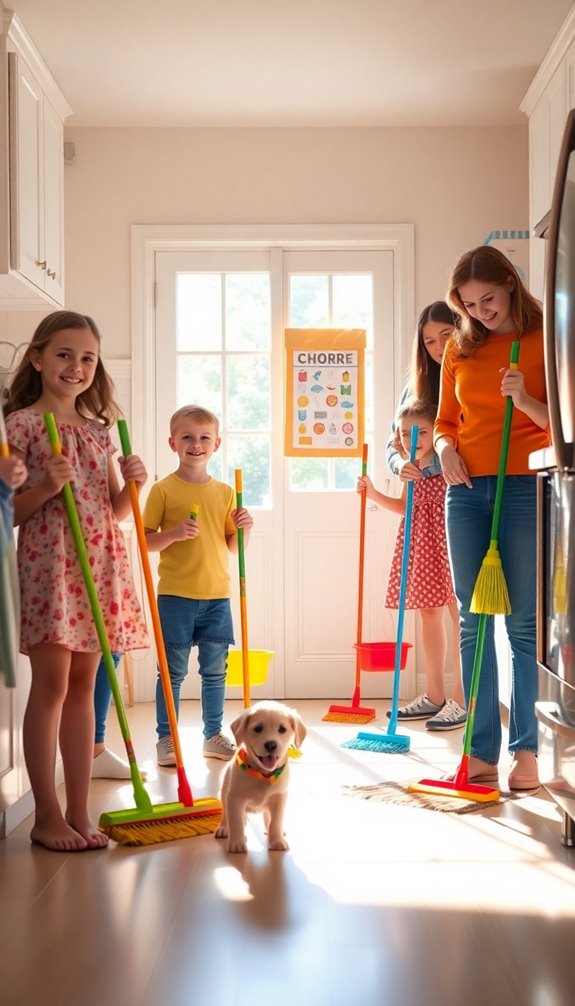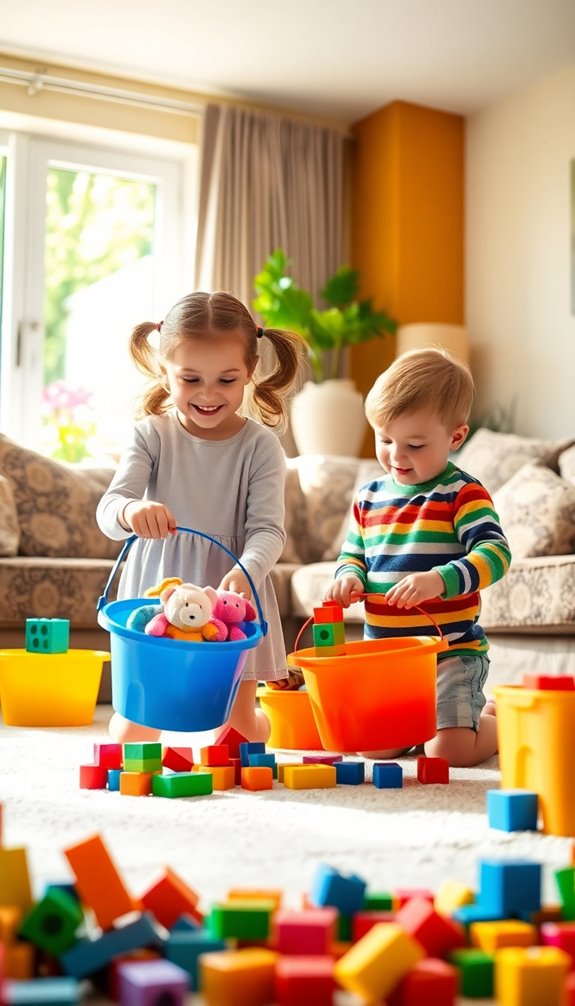To get your kids involved in cleaning, start with age-appropriate tasks that fit their skills. Use simple chores for toddlers, like picking up toys, and gradually introduce more challenging ones as they grow. Establish a consistent cleaning routine so chores feel normal, and set specific times for clean-up. Make it fun by turning tasks into games or playing upbeat songs. Celebrate their achievements with praise or a rewards chart to keep motivation high. By fostering teamwork and sharing responsibilities, your household can be tidy and enjoyable for everyone. Discover additional tips to enhance this family bonding experience further.
Understanding Kids' Resistance to Cleaning
Many kids resist cleaning because they see it as an interruption to their playtime. When you ask them to tackle cleaning tasks, they often feel overwhelmed, viewing chores as a burden rather than a responsibility. This resistance can stem from a lack of motivation or understanding of how maintaining a tidy home benefits them. Incorporating time-saving strategies into their cleaning tasks can make the process feel less daunting and more manageable. Additionally, establishing a consistent cleaning routine can help them understand what is expected and make cleaning a natural part of their day.
Kids prioritize play and exploration, which means cleaning may seem like an imposition on their fun. Without guidance, they mightn't know how to approach these tasks effectively. Developing organizational skills takes time and consistent support, as many children don't naturally possess these skills from a young age. To help your kids overcome their resistance, consider introducing cleaning tasks gradually. Start with small, manageable chores and provide encouragement along the way. Explain the importance of a tidy environment and how it helps everyone feel more comfortable. Additionally, involve family members in cleaning routines to create a sense of teamwork and shared responsibility.
Age-Appropriate Cleaning Tasks
Introducing age-appropriate cleaning tasks can make a significant difference in how your kids perceive chores. For toddlers (1-3 years), start with simple tasks like picking up toys and wiping up spills. These activities foster early responsibility while keeping them engaged through play.
As they progress to preschoolers (4-6 years), you can introduce slightly more complex tasks such as making their beds and clearing the table. This helps them develop independence and a sense of contribution to the household.
Once your kids reach elementary age (7-9 years), they can handle chores like sweeping floors and setting the table. These age-appropriate tasks not only build their confidence but also instill a sense of accountability.
Incorporating age-appropriate cleaning tasks into your routine ensures that children feel included and valued in maintaining a tidy home.
Assigning tasks suited to their abilities guarantees they won't feel overwhelmed, allowing them to gradually grow in both skill and responsibility.
Establishing Consistency and Routine

When you establish a consistent cleaning routine, your kids are more likely to accept chores as a normal part of their day.
Start by setting scheduled clean-up times that fit into your family's daily habits. This predictability helps children anticipate their responsibilities and reduces feelings of overwhelm. Additionally, incorporating seasonal cleaning tasks into your routine can provide structure and variety to the cleaning process.
Consider using reminder alarms to signal the start of these cleaning sessions, making shifts smoother and reinforcing the importance of regularity in cleaning practices.
As your kids engage in these tasks, they'll develop a sense of responsibility, realizing that maintaining a tidy home is a shared effort.
Working together during these clean-up times not only fosters teamwork but also makes chores feel less burdensome. Implementing a 10-minute tidy-up routine can help make cleaning feel manageable and fun.
Don't forget to incorporate positive reinforcement; celebrate their efforts and progress to keep them motivated.
Making Cleaning Fun
Transforming cleaning into a fun activity can make all the difference in how your kids perceive their chores. To keep a tidy home, turn clean-up time into a game! Use timers to create a challenge, encouraging your young children to beat the clock while they put something away.
Play an upbeat clean-up song to energize the atmosphere, making the entire family excited to pitch in. Incorporating daily declutter routines can also help children understand the importance of maintaining a clean space. Engaging them in a routine fosters a sense of calmness that can make the process feel less daunting.
Introduce "magic trash" as a playful way for kids to earn points for every piece of litter they pick up. This turns a mundane task into a rewarding adventure. Engage them with playful challenges, like racing to see who can gather the most toys in a set time. This fosters both teamwork and a spirit of friendly competition.
You can also create themed cleaning days, such as "Superhero Clean-Up Day," where kids can dress up and imagine they're saving the world while tackling household chores. This not only makes deep cleaning enjoyable but also creates lasting memories. Additionally, incorporating regular cleaning routines can help establish a consistent cleanliness that encourages children to take pride in their environment.
Encouraging Collaborative Efforts

Making cleaning a fun experience sets the stage for collaboration among family members. When you involve your kids in cleaning, you foster a sense of teamwork that makes the process enjoyable and efficient. Assign each child a specific zone to maintain; this encourages shared responsibility and helps them take ownership of their tasks. Using microfiber cloths can enhance their cleaning efficiency while making the task more enjoyable. Additionally, incorporating daily cleaning routines can streamline the process and promote a consistent effort in maintaining their assigned zones.
By working together, you help keep your home clean while teaching them valuable skills. Incorporating daily "Power 10s" can also make cleaning feel less overwhelming. These quick, timed sessions turn tidying into a fun challenge that the whole family can tackle together.
Additionally, implementing a structured cleaning schedule not only helps keep tasks organized but also promotes consistency in maintaining cleanliness. Rotate group leaders during these sessions, allowing each child to take turns leading the efforts. This not only builds leadership skills but also instills a sense of accountability.
Finally, celebrate your collective cleaning accomplishments! A tidy living space is a great reward for your efforts and reinforces positive behaviors. Recognizing the hard work everyone put in helps motivate your kids to clean and participate in future collaborative efforts.
Positive Reinforcement Strategies
To keep kids motivated, set up a reward system that helps track their cleaning achievements visually. Celebrate even the small wins, as this recognition can boost their confidence and enthusiasm. Additionally, involving them in age-appropriate chores can make cleaning feel less like a task and more like a fun family activity. Encourage them to use multi-purpose cleaners to simplify their cleaning tasks and instill a sense of responsibility. By incorporating eco-friendly products, you can teach them the importance of sustainability while they clean.
Reward System Implementation
A well-structured rewards chart can greatly boost kids' motivation to participate in household cleaning tasks. By implementing a reward system, you can track your children's cleaning efforts and offer tangible rewards like stickers or small prizes for completed chores.
This points system encourages them to take ownership of their responsibilities and reinforces positive behavior. For each cleaning task they complete, they earn points that can be redeemed for privileges or treats, making the process fun and engaging.
Additionally, consider introducing surprise chore days where kids can earn double points or stars. This creates excitement and encourages proactive participation in maintaining a tidy household.
Celebrate Small Achievements
Celebrating small achievements in cleaning not only boosts kids' confidence but also reinforces the joy of responsibility. To foster a love for tidying up, implement a rewards chart where you can track your children's cleaning tasks. When they complete a task, offer immediate praise and recognition, as this positive reinforcement encourages them to keep participating.
You might also introduce a "cleaning party" concept, where kids earn points for their efforts. These points can be exchanged for fun activities or treats, creating an enjoyable incentive for maintaining a tidy home.
Organizing family recognition sessions allows your children to share their contributions, fostering pride and accountability in their cleaning efforts.
Don't forget to surprise them with rewards for unexpected clean-up efforts! This spontaneous recognition strengthens their connection between cleaning and positive outcomes, making chores feel more rewarding.
Conclusion
Involving your kids in cleaning transforms a chaotic home into a harmonious haven, like turning a disheveled garden into a blooming paradise. By planting the seeds of responsibility and nurturing their sense of contribution, you cultivate not just a tidy space but also valuable life skills. Remember, every small effort they make is a step toward a brighter, more organized future. So, grab those brooms and dusters, and watch as your household blossoms together in unity and joy.